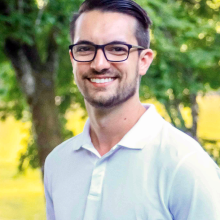August 2021 Spotlight on SRCD U.S. Federal Policy Fellow: Christian Clesi, Ph.D.
Christian Clesi is an SRCD Federal Congressional Policy Fellow who is placed in the Office of U.S. Senator Bob Casey.
As a doctoral student I was able to develop a training plan that focused on applied developmental psychology and prepared me to work outside of traditional academic roles. I was fortunate to have a mentor who was also licensed in clinical psychology and made it possible for me to explore my interests beyond the classroom and research lab. During my studies I worked at a diagnostic clinic for children with developmental disabilities, worked for a state-funded autism agency, and worked with a collaborative team to develop community-based trainings for parents of children with autism.
I engaged with families from many different backgrounds and communities across Alabama and they consistently had one thing to say about disability services – they were not accessible to them. Hearing from families that the system was not working for them encouraged me to pursue a career to influence policy and enact meaningful change through my training as a developmental scientist. In that regard, SRCD’s Congressional Policy Fellowship was the perfect opportunity for me to use what I learned at the state level, including funding mechanisms, the organization of state government, and how policies are developed, passed into law, and implemented, to build on my understanding of how federal policymaking works.
Currently, I am a Congressional Fellow on Senator Robert Casey’s (D-PA) Special Committee on Aging staff, where I primarily work on disability policy. I have worked in a wide range of policy areas, as disability is pervasive throughout all aspects of life. During my fellowship year I have worked on legislation related to people with disabilities and mental health and human-services supports, employment and financial well-being, higher education, workforce development, and disaster preparedness. Engaging in such a broad portfolio has given me the opportunity to utilize my training as a developmental psychologist to provide input and advance policy in the field while learning strategies for developing and moving legislation in-depth. I have been able to provide input as a developmental psychologist, including how to develop programs intended for people with disabilities and programs to improve interactions between people with disabilities and law enforcement officers to ensure everyone’s safety. I have also used my knowledge of the disability network, including various local, state, and national organizations to build coalitions of support for legislation. In terms of building support and advancing legislation, I have negotiated with offices in the House and Senate to develop legislation, worked with Pennsylvanians and national stakeholders to edit legislative text, and engaged with Senate committee staffers to plan legislative strategy. In each of these roles, my training as a developmental psychologist has prepared me to speak to the needs of people with disabilities and how legislation would address them.
Most notably, I have been charged with advancing Senator Casey’s Law Enforcement Education and Accountability for People with Disabilities (LEAD) Initiative, which is a package of bills intended to reduce the number of violent interactions between people with disabilities and law enforcement by diverting non-criminal emergency calls away from 9-1-1 and to 2-1-1 for human-services supports and/or to 9-8-8 (which will become active in July 2022) for mental health needs. LEAD also includes a bill to provide disability-specific training to law enforcement officers and to improve data collection on the interactions between people with disabilities and law enforcement. This has been my most meaningful work during the fellowship as I have spoken with families that have lost a loved one or had a family member injured in an interaction with law enforcement that could have been approached differently. I have also been able to connect stakeholders and constituents with the Senator to discuss their experiences and engage in conversations on how to improve the mental health response system in America.
Working on this diverse legislative portfolio has allowed me to learn about the organizational structure of many government agencies, including how funding from legislation is routed to agencies and states, how research and oversight is written into legislation to ensure proper implementation of laws, and how government agencies can support the work of legislative staff. In addition, I have been able to engage with government agencies and organizations to plan and discuss legislation and how their work, including research and evaluation, can support legislation. Through my experiences, I have also learned the importance of building broad coalitions to advance a bold legislative agenda. Throughout my fellowship experience I have developed and maintained relationships with a diverse group of stakeholders and advocates in the disability field that will continue to be assets over the course of my career. As a developmental scientist, I have also been an asset to my office in researching and planning legislation and I have been able to provide input related to my firsthand experience working with children with disabilities and their families to the work we do. The structure of the SRCD Congressional Fellowship puts me in a position to make these connections and the support from the SRCD staff has been integral to my placement in such an impactful office for disability policy.
